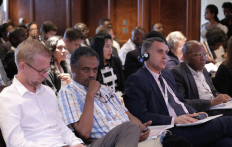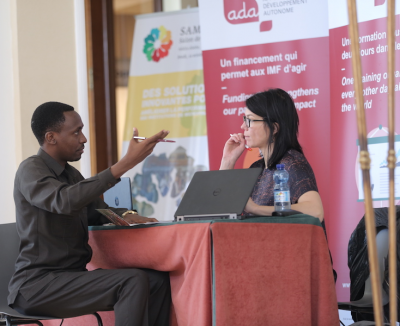- Yves Komaclo (Oikocredit)
- Rémy Mitima (Paidek)
- Francisco Cuamba (Microbanco Confianca)
- Philippe Guichandut (Grameen Credit Agricole Foundation)
- Azaratou Sondo Nignan, (RCPB)
- Nadège Djatty (FIDRA)
- Mohamed Asri (HPS)
- Caroline Karanja (AMFI) & Cameron Goldie-Scot (Musoni Services)
- Dramane Eric Conombo (Caisse Populaire Cissin)
- BNP Paribas
- Other testimonials
How Oikocredit Leveraged SAM to Expand Its Risk management Program
Since 2015, Dutch cooperative investor Oikocredit has offered a risk management program for MFIs. Participating institutions have built action plans around efforts such as: (1) increasing their use of data from credit bureaux to reduce over-indebtedness; (2) adjusting loan officers’ workload and training to improve client service; and (3) surveying clients about product terms. When expanding the program to a new country, Oikocredit holds a workshop that is open to the entire sector to engage potential partners. From this pool of workshop attendees, those who demonstrate the greatest motivation and ability to make progress in risk management receive a package of consulting services lasting 18 to 24 months.
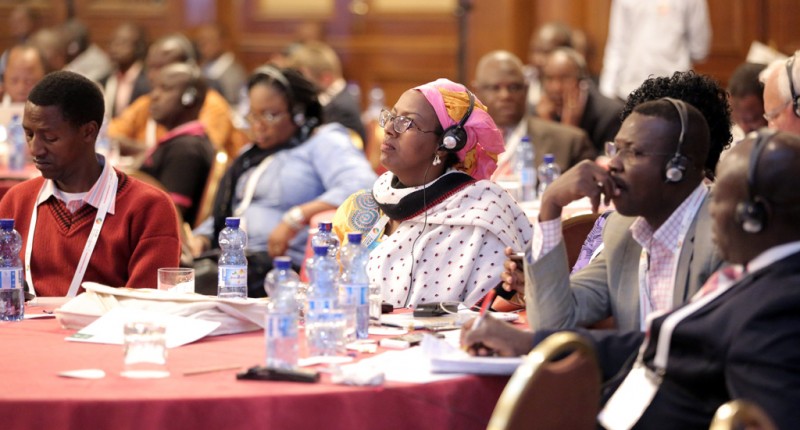
The program first was active in Benin, Ghana and Togo. As a result of Oikocredit’s sponsoring an event at the 2015 SAM in Dakar to increase awareness of its risk management efforts, several institutions from other countries expressed interest in the program. One of these was the Association Professionnelle des Systèmes Financiers Décentralisés du Sénégal (APSFD/Senegal), whose members include 105 savings & loan associations, cooperatives, MFIs and other financial services providers.
At the 2017 SAM in Addis Ababa, representatives of Oikocredit discussed the risk-management program with staff from ICCO Cooperation, a group of entities that seek to “create profitable opportunities that lead to more employment and higher income for people” in low- and middle-income regions. Based on their work in 36 countries, ICCO Cooperation staff argued that Burkina Faso would be a prime market for Oikocredit’s program. After Oikocredit staff met with existing and prospective partner institutions from the country, such as Asiena, Prodia and the Federation des Caisses Populaires du Burkina (FCPB), they agreed that expanding in Burkina Faso would be fruitful.
"We reviewed our priorities after SAM and promoted Burkina and Senegal to include them in the next phase of the risk management program."
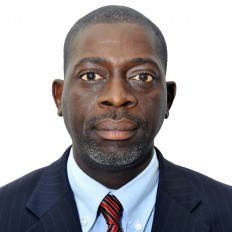
Yves Komaclo, director of Oikocredit in charge of West Africa, explains: "We reviewed our priorities after SAM and promoted Burkina and Senegal to include them in the next phase of the risk management program. " Oikocredit is now working with ICCO Cooperation to expand the program and serve MFIs in Burkina Faso, Mali and Senegal.
In parallel with the risk management program, Oikocredit progressed on other fields during the SAM. For example, his team spoke about the digital initiative for Oikocredit's MFIs in Burkina Faso with the Burkina Faso Private Enterprise Credit Agency (ACEP), one of five members of ACEP International. This initiative aims to facilitate access to financial services for micro-enterprises and SMEs by exploiting Oikocredit's fintech experience in supporting MFIs wishing to adopt mobile financial services.
During speed-dating sessions and informal conversations during the SAM, Oikocredit also identified partners interested in social audits and evaluations of their client protection practices. Among these partners are the Network of Micro-institutions of Income Growth, a mutual credit and savings of Mali and the Mutual Savings and Credit (MEC) Fadec Njambur of Senegal.
How Paidek is Leveraging SAM to Diversify its Funding Sources and Product Line-up
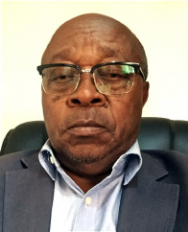
Remy Mitima, who serves as general manager of the Congolese microfinance institution Paidek, has attended all three SAMs. He explains, “In Arusha, I met partners who ended up loaning us a total of USD 500,000 in two phases. This helped us strengthen our credit portfolio and serve more people. Today, we have an additional loan from the same partners.”
At the second SAM in Dakar, Remy and his team strengthened their relationship with other organizations that may help with the evolution of the MFI’s technology. Musoni is one group with which they began discussions, but Paidek hasn’t moved forward in this area yet due to budget constraints.
“I met partners who ended up loaning us a total of USD 500,000…. Today, we have an additional loan from the same partners.”
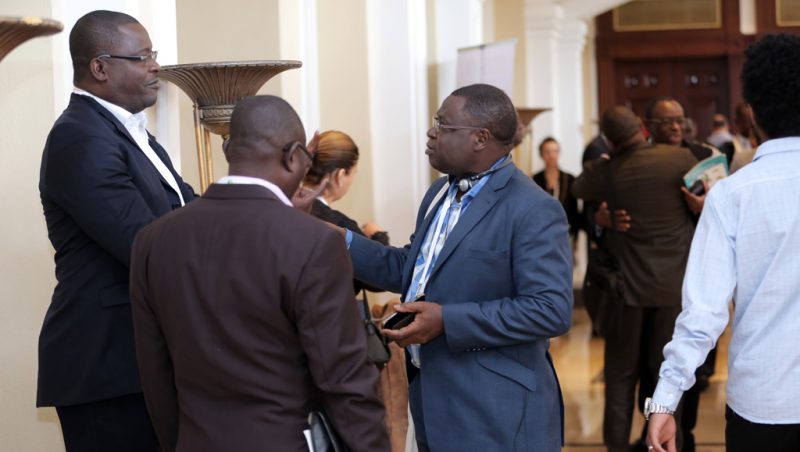
At the most recent SAM in Addis, Remy says his team learned “a lot about lending to youth.” As a result, the institution has resolved to adjust its methods for working with young people. Paidek has submitted an application to the UN to support these changes and now is waiting for a reply. Attendees from Paidek also met with old and new partners regarding the organization’s transformation from an NGO into a for-profit entity, which remains ongoing.
Paidek, which is located in the city of Bukavu in the Democratic Republic of the Congo, was founded in 1996 and now has nine branches. The institution has total assets of USD 5.3 million, a gross loan portfolio of USD 3.9 million outstanding to 15 million borrowers, and USD 500,000 held for 980 depositors.
Remy also serves as President of the Microfinance African Institutions Network (MAIN). MAIN, which is a co-organizer of SAM, officially merged with Africa Microfinance Transparency during the most recent SAM. Based in Togo, MAIN has 84 members with an aggregate loan portfolio of USD 1.26 billion outstanding to 3.2 million customers in 23 countries.
Using SAM to Align Financing Needs, Social Impact in Mozambique.
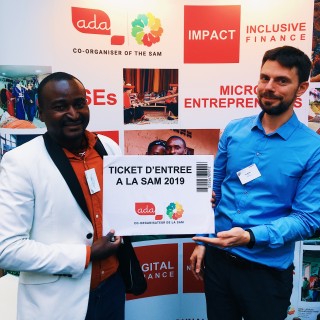
When Francisco Cuamba, the Finance Director of Mozambique’s Microbanco Confianca (pictured at left), came to Luxembourg for European Microfinance Week in November, he was very pleased to win a free registration to the 2019 SAM, which will be held in late October in Ouagadougou, Burkina Faso. Reflecting on the 2017 SAM in Ethiopia, he said, “My participation in SAM was an extremely important opportunity to meet different organizations from all over the world, to share different experiences and meet some investors to which to present my organization. The type of investors we sign should be social investors that are not only concerned with the profitability of the investment, but also our extensive involvement in the development of our community and changing lives.” In particular, Mr Cuamba expressed plans to learn more about SPI4, the fourth round of a set of social performance indicators (SPIs) intended to simplify reporting and provide a common language for social performance management. The 2017 SAM included a full-day training on SPI4, and similar opportunities are available at the 2019 SAM. Check out the agenda for more info!
“My participation in SAM was an extremely important opportunity to meet social investors that are not only concerned with the profitability of the investment, but also our extensive involvement in the development of our community and changing lives.”
Microbanco Confianca was created by the NGO Hluvuku-Adsema, which was formed in 1996. The institution now has 13 branch locations, 87 employees and 9,120 clients. With a loan portfolio equivalent to USD 3.5 million, it generated return on equity of 17 percent and return on assets of 9.1 percent during 2017. The majority of the staff and clients of the organization are women. The creation of Microbanco Confianca, which remains owned by Hluvuku, will allow the institution to accept deposits.
SAM Enables Partnership Between ID Ghana, Grameen Credit Agricole Foundation.
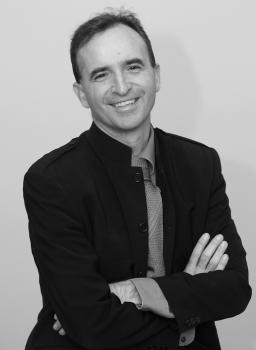
Philippe Guichandut, the Head of Inclusive Finance Development at the Grameen Credit Agricole Foundation, has been at all three SAMs. The majority of the foundation’s 76 partners are in sub-Saharan Africa, and Mr Guichandut has found that “SAM is the best place to meet our existing and potential partners.” He adds, “Around the SAM, we always take the opportunity to gather our partners, [which] is the best way to have exchanges of experience among our partners and give them the opportunity to attend some training sessions either organized by ourselves or the SAM.” Leading and attending workshops at SAM has been key for Mr Guichandut’s team “to share our own experience and promote themes that are relevant for us, especially in the fields of agri-microinsurance and agri-financing.” For example at SAM in Ethiopia in 2017, the foundation organized a field visit for 11 MFIs to learn about the R4 Rural Resilience Initiative, an agri-microinsurance project of the World Food Program and Oxfam America. Attendees visited Africa Insurance, Nyala Insurance, the microbank DECIS, and two local NGOs, ORDA and REST.
“SAM is the best place to meet our existing and potential partners.”
Mr Guichandut added that SAM’s “Investor’s Fair is also an excellent venue to meet potential new partners and have a better understanding of the different types of MFIs that would be interested in working with us.” For example, his team met representatives of ID Ghana for the first time at the fair. That relationship has flourished, and the Grameen Credit Agricole Foundation is now funding ID Ghana through the African Facility, a collaboration between the foundation and Agence Francaise de Developpment.
RCPB Improves Youth Training, Links with Solar Provider at SAM.
Le Réseau des Caisses Populaires du Burkina (RCPB), a savings and credit cooperative with 180 locations in Burkina Faso, has sent several staff members to each SAM conference. In Dakar, they made contact with a provider of solar light kits that hold a charge for four days. RCPB now lends to women to purchase these kits, which can have a wide range of benefits, such as increased student study time and reduced indoor air pollution from burning kerosene.
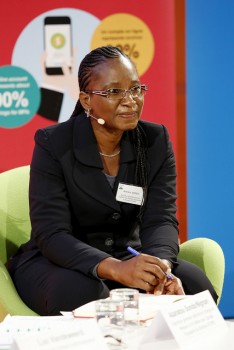
Azaratou Sondo Nignan, the deputy director of RCPB, was part of a delegation that presented at SAM on the institution’s youth loans. In addition to sharing its expertise with other organizations, the delegation brought back ideas that helped improve the training that RCPB’s young borrowers receive in support of their loans.
RCPB staff also heard from a representative of a firm in Niger that offers a system to control irrigation canals remotely. Ms Sondo feels this would be beneficial to RCPB clients, but the cost is too high at this time.
Ms Sondo is very pleased that the next SAM will take place in her country for many reasons, including that several microlenders in Burkina Faso have acquired financing based on relationships that were developed at prior SAMs.
“We came back with ideas that helped improve the training that RCPB’s young borrowers receive…” - Azaratou Sondo Nignan, Le Réseau des Caisses Populaires du Burkina.
Founded in 1972, RCPB offers savings; group and individual loans; and insurance in case of natural disaster, disability or death. It has loans designed for artisans, agriculture and housing. The cooperative also offers non-financial services such as business consulting and financial education.
FIDRA of Cote d’Ivoire Re-thinks Client Needs at SAM
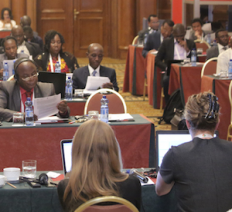
Nadège Djatty, the assistant director of FIDRA, an MFI in Côte d’Ivoire, attended the most recent SAM in Addis Ababa, Ethiopia. While there, she was one of about 100 people at the full-day training on the Universal Standards for Social Performance Management, which was delivered by Amelia Greenberg and Katie Hoffmann of the Social Performance Task Force (SPTF). After the training, Ms Djatty told Ms Greenberg that the “training had caused her to think more deeply about who they were excluding as clients because the products are not quite right for their needs and how they might adapt their products to be more inclusive.”
Ms Greenberg also met several leaders of institutions that subsequently applied for co-funding from the SPTF-run Responsible Microfinance Facility to help them “put clients at the center of every decision.” Among these were Arsène Koffi, the programs manager at the 48-member Association Professionnelle des Systèmes Financiers Décentralisés (APSFD) de Côte d’Ivoire, and Charlemagne Yankoty, the director of IAMD-Microfinance of Benin.
“Our training had caused her to think more deeply about who they were excluding as clients...” - Amelia Greenberg, SPTF
Ms Greenberg adds, “SAM helps SPTF stay focused and connected. Attending SAM also allows us to share what SPTF has been working on and receive feedback on areas of greatest need going forward. It is an extremely well organized event and offers an unparalleled opportunity for us to meet in person with so many of our partners in Africa, as well as to speak to organizations we’d like to work with in the future.”
HPS Poised to Digitize Network of MFIs in Benin After Participation in SAM Innovation Fair, Successful Rollout to 3 Network Members
During the “Innovation Fair” of the most recent SAM, Mohamed Asri of Morocco-based payment solutions provider HPS spoke about his firm’s microfinance strategy, including its suite of PowerCARD tools. Mr Asri called SAM “a great opportunity for us to meet dozens of MFIs in Africa and present to them our activity and our products.” These meetings led to HPS signing a memorandum of understanding with Consortium Alafia, a network of 44 MFIs in Benin. To date, three Alafia members have tested PowerCARD Microfinance, which offers pay-as-you-go pricing to manage functions such as client transactions, internal finances, services provided via agents, Shariah-compliant products, field staff using mobile devices and third-party services such as insurance. An agreement to roll the service out to most of Alafia’s members is currently under negotiation.
In addition to speaking at SAM, Mr Asri managed a demonstration booth on the fourth day of the event. He explains, “We were able to design [the booth] according to our marketing needs. A large number of MFIs were able to contact us and learn more about the competitive advantages of our products.” He added that MFI leaders were most interested in how digitizing could help reduce operating costs and how flexible the products could be. Mr Asri also emphasized the potential for digital tools to improve the productivity of MFIs’ agents.
“I am so happy with my participation that I am renewing my partnership with SAM as a ‘Silver’ sponsor to maximize awareness of our work.” - Mohamed Asri, HPS (pictured second from right)
As a result of its involvement with SAM, HPS has joined the Micro-finance African Institutions Network (MAIN), a member of the SAM steering committee, in order to maintain and expand its networking with SAM attendees. Mr Asri said, “I am so happy with my participation that I am renewing my partnership with SAM as a ‘Silver’ sponsor to maximize awareness of our work.” At the 2019 SAM in Ouagadougou, HPS is considering running an exhibit booth throughout all five days of SAM, rather than just on the day of the Innovation Fair. The firm also is looking into creating a “Fintech Village,” a larger space inside the Innovation Fair where HPS can feature all of its activities, products and innovations. For example, it will show off its HPS PAY solution by letting participants download the app to test its mobile payment tools. They will be able to use it to access bitcoin, which they then can spend on drinks provided by HPS. In summary, Mr Asri says, “In 2019, SAM will be key to my commercial strategy. In fact, I wish a future SAM will be organized very soon in Morocco.”
18 Months After SAM, Better (Digital) Services for 200k Kenyans
Caroline Karanja, the CEO of Kenya’s Association for Micro-finance Institutions (AMFI), said that, “The SAM conference in Addis gave us a platform to meet with new partners with whom we have created a steady working relationship since.” AMFI’s membership of 51 includes microbanks, credit institutions and other actors in the country’s microfinance sector. One of the organizations that Ms Karanja learned about at SAM was Musoni Services, which offers a software-as-a-service package called the Musoni System. This system is licensed to 90 MFIs in 16 countries in Africa and Asia. Together, these MFIs serve 756,000 people. (Musoni Investments, which is based in the Netherlands, holds stakes in Musoni Services as well as Musoni Microfinance, an MFI in Kenya.)
Cameron Goldie-Scot, the CEO of Musoni Services, said, “We found the conference both interesting and beneficial, in part because of the relationship we were able to start with AMFI…. After meeting during SAM 2017, Musoni Services has worked closely with AMFI.… Our focus has been on helping financial institutions in Kenya to leverage technology like the Musoni core banking system and Musoni mobile app to improve efficiency and their customers' experiences.”
“The SAM conference in Addis gave us a platform to meet with new partners with whom we have created a steady working relationship since.” - Caroline Karanja, CEO, AMFI
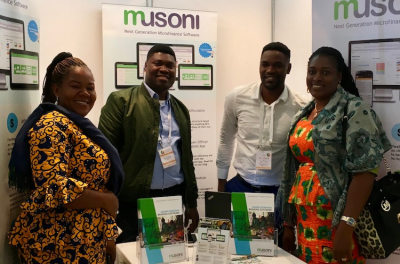 Mr Goldie-Scot added, “AMFI has been key in helping Musoni better understand the questions about technology coming from the Kenyan microfinance sector. In turn, we’ve been proud to sponsor a number of AMFI events, including workshops focussed specifically on emerging technology trends, and as a result have been able to showcase Musoni to many organisations in the country. Musoni now works with 10 MFIs in Kenya serving over 200,000 end customers. We look forward to building on this relationship over the course of 2019 and beyond!”
Mr Goldie-Scot added, “AMFI has been key in helping Musoni better understand the questions about technology coming from the Kenyan microfinance sector. In turn, we’ve been proud to sponsor a number of AMFI events, including workshops focussed specifically on emerging technology trends, and as a result have been able to showcase Musoni to many organisations in the country. Musoni now works with 10 MFIs in Kenya serving over 200,000 end customers. We look forward to building on this relationship over the course of 2019 and beyond!”
MFIs in Mali, Burkina Faso adopt Microfact for Performance Evaluation, Decision-making after Presentation at SAM
Two NGOs, ADA of Luxembourg and BRS of Belgium, presented their Microfact toolkit at the SAMs in Dakar and Addis Ababa, reaching many MFI leaders representing both MFIs and various membership associations. As a result, several of these organizations hosted trainings on the use of the free toolkit, which includes “moni-toring and financial performance analysis” tools used by about 1,000 organizations. Two of these tools are MFI Factsheet, which is used for monitoring the past financial and social performance of MFIs, and Microvision, which creates five-year projections for business planning. Microfact trainings are offered by about 60 certified individuals around the world. As a result of meeting Basile Kouagou N’Dah, a certified Microfact trainer, at SAM, the Association Professionnelle des Systèmes Financiers Décentralisés du Mali hosted a training on Microfact in November 2017. It was so successful that the organization held a second training in April 2018. Similarly, a training hosted by the Réseau des Caisses Populaires du Burkina in December 2017 inspired several of the organization’s member credit unions to adopt MFI Factsheet as a decision-making tool. They use it to analyze their financial and social results as well as to organize staff and board meetings around driving sustainable growth. Amidou Alou, the director of the Caisse Populaire in the Dassasgho neighborhood of Ouagadougou, reports that MFI Factsheet has boosted the performance of his organization.
“MFI Factsheet is our strongest asset when it comes to evaluating our institution’s performance.”- Dramane Eric Conombo Director, Caisse Populaire Cissin
Dramane Eric Conombo, the director of the Caisse Populaire in the Cissin neighborhood of Ouagadougou, says, “MFI Factsheet is our strongest asset when it comes to evaluating our institution’s performance.” The Microfact toolkit, including Microvision, will be presented to attendees at the next SAM, which will take place in Ouagadougou from October 21-25, 2019.
BNP Paribas to Prep MFIs to Win Over Investors at SAM
BNP Paribas is celebrating the 30th anniversary of its microfinance activity this year. The bank’s contribution to the sector has evolved greatly over this time, as has the microfinance ecosystem itself. While the need for financial inclusion continues to be critical, BNP Paribas is proud of its track record of support for MFIs. After 30 years, the bank continues to finance more than 30 MFIs directly, with close to EUR 300 million (USD 340 million) deployed.
We are celebrating this landmark in several parts of the world, and it quickly became obvious that the SAM would be the best event to partner with in showcasing our activities in Africa.
During our long history, we often have been disappointed to watch MFIs that do solid field work fail to flourish because they either lack the capacity to advertise to the international funder community or fail to make a good impression during the introduction process. Thus, in addition to sponsoring this year’s SAM, BNP Paribas is joining forces with other investors to arrange a training session for top executives of financial services providers under the banner “Everything You Always Wanted to Know about Investors’ Needs (but Were Afraid to Ask).” This session has an open and interactive format to give representatives of all types of MFIs (especially smaller ones) the opportunity to learn more about the needs of investors and how to present their institutions to them. This includes an array of topics such as how to assess an MFI’s strengths and the importance of transparency, proactive communication, clear governance structures, financial and social performance, relationships with local regulators, involvement with local and regional networks, etc.
Each microfinance practitioner will be mentored by an investment officer or risk manager who has committed to represent the investor community at large with the goal of helping the financial inclusion sector as a whole to grow even stronger. We welcome all MFI practitioners participating in SAM to sign up for this great session. The event will be held in both French and English as part of Arendt’s “Ready for Investors?” day on Monday, October 21. In fact, that entire day is aimed at helping MFIs to get ready for SAM’s already famous Investors’ Fair!
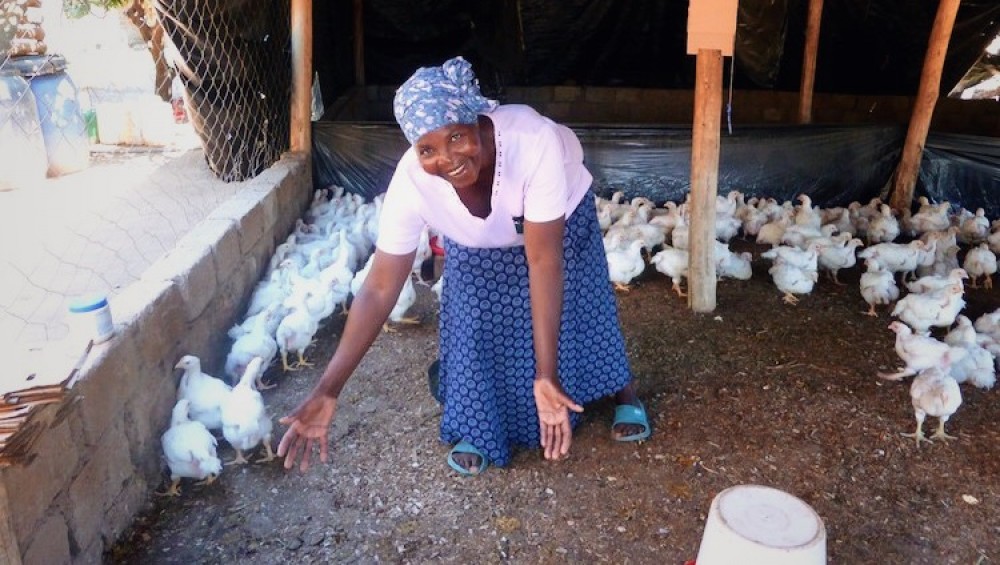
“…we often have been disappointed to watch MFIs that do solid field work fail to flourish…”
Each microfinance practitioner will be mentored by an investment officer or risk manager who has committed to represent the investor community at large with the goal of helping the financial inclusion sector as a whole to grow even stronger. We welcome all MFI practitioners participating in SAM to sign up for this great session. The event will be held in both French and English as part of Arendt’s “Ready for Investors?” day on Monday, October 21. In fact, that entire day is aimed at helping MFIs to get ready for SAM’s already famous Investors’ Fair!
Other testimonials
Ambroise Fayolle, Vice-President of the European Investment Bank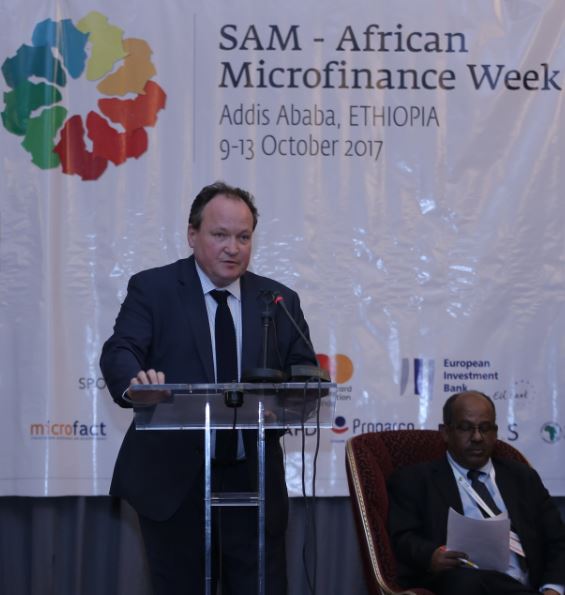
“The EIB was very happy with the whole organisation of the SAM 2017. My colleagues and I appreciated the level of the panel discussions, and the event was a great opportunity to meet new potential clients, established partners, peers and other investors, both at the stands and during the investment fair. While we were delighted to be able to underline our Bank’s commitment to investing in high impact projects in microfinance and equity in Africa, we also learned a lot. We are already looking forward to the next SAM!”
Stephen M.K. Dugbazah, General Manager at Initiative Development-Ghana (ID Ghana)
“As a Financial NGO supporting the less privileged with affordable small loans and training, access to less expensive loan fund for on-lending has always been a challenge until we started participating in the Investors fair at the SAM. Thanks to the SAM ID Ghana FNGO now has access to Social funds and Technical supports, from Fefisol, Alterfin, ADA, Grameen Credit Agricole and SPTF”.
Ruchit Garg, Founder & CEO at Harvesting Inc, winner of the Fintech Prize for Microfinance 2017 worth 10,000 euros
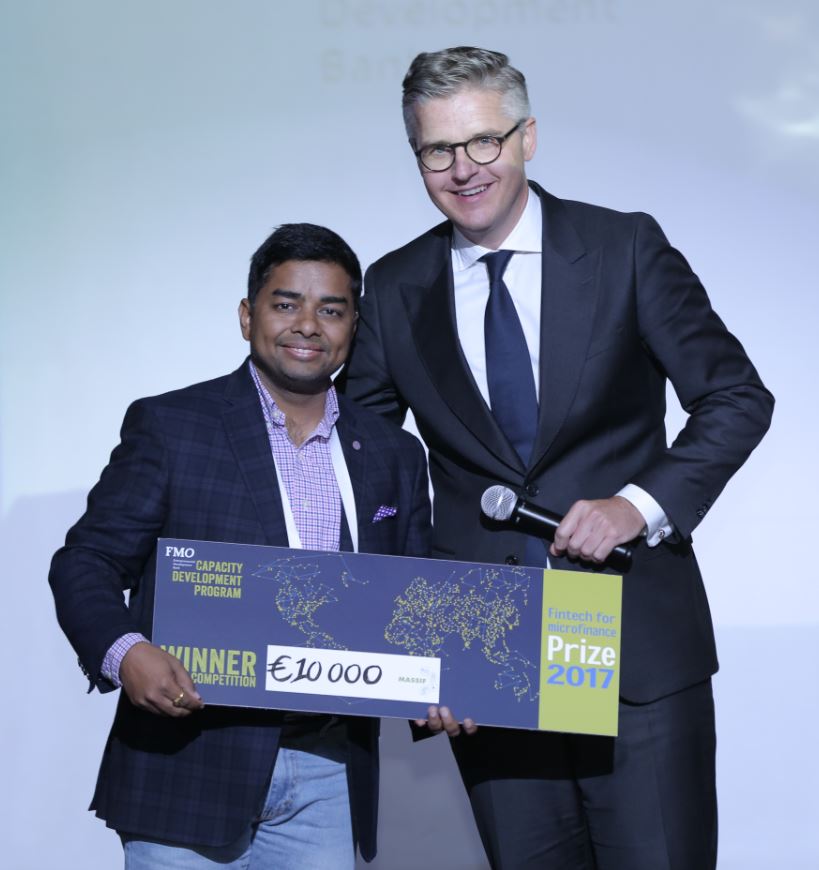
"The €10,000 prize was extremely valuable for us as we seek to scale our work to more farmers in under-served markets. We spent the prize money bringing in a new remote sensing scientist and carrying out field research with potential partners in Nigeria and Kenya. The publicity from SAM and FMO was also significant in increasing our market visibility and opening up new partnership opportunities."
Jeroen Harteveld, MASSIF Fund Manager at FMO
"The mission of FMO is to empower entrepreneurs to build a better world. We want to stimulate local economic growth, create jobs that generate income thereby improve livelihoods of people and drive local prosperity in places where it is needed most. Capital, knowledge and networks are essential to address financial inclusion. The SAM brings all this together: impact investors, financial inclusion experts and investment opportunities making this a great event."
Sambou Coly, Program Manager at Mastercard Foundation
"SAM 2017 provided us with a framework for thinking about the reasons that still limit access to basic financial services for millions of people in Africa. These moments of reflection are an important barometer to validate but also to reconsider certain choices in order to enable us to achieve a goal that we all have in common."
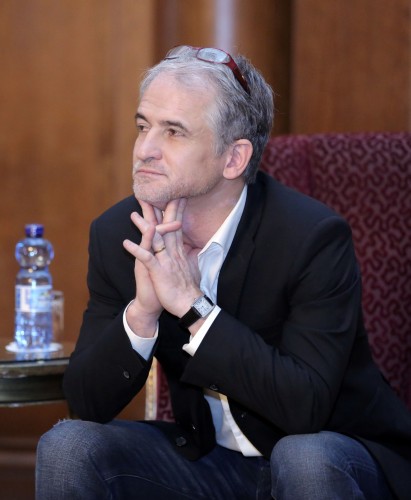
Eric Campos, Managing Director at Grameen Crédit Agricole Foundation
"The African Development Bank recently presented the 2018 edition of the African Economic Outlook. According to it, China, and its approach to national development, can be a source of inspiration for Africa. Recall that in 1979, China's GDP per capita was one-third of the average for sub-Saharan Africa. Since its "economic revolution" almost 40 years ago, annual growth has averaged nearly 10%.
According to the AfDB, China has managed to move away from the prevailing economic thinking, advocated by international bodies, to adopt a pragmatic approach: support large capital-intensive companies and open the industrial economy to private companies interested in exploiting the comparative advantage of China.
The AfDB draws three lessons on the economic development of a continent: it must feed on pragmatism adapted to realities on the ground, it must benefit from an industrial strategic framework allowing technological innovation and industrial modernization and finally, the "invisible hand" and the state must take their share of respective responsibilities in the economic transition, by interest or obligation.
Without judging the quality of the implementation of such an approach and its impact on the environment and society, of which there would be a great deal to say, there is in these three points a very relevant reading grid that is a perfect fit for the microfinance sector in Africa.
Microfinance has become as indispensable to the development and functioning of northern and southern economies and societies as traditional finance. In ten years, the penetration rate of microfinance has multiplied by 2.5 and outstandings multiplied by 4. These financing mechanisms for low-income people are taking a vital place for small rural economies. The SAM, gathered this year in Addis Ababa, Microfinance Institutions from all over the African continent, regulators (central banks ..) and private investors (donors, social investors, foundations, funds ...).
The approach proposed in the context of this African Microfinance Week is remarkable because it basically adopts the same approach as that promoted by the AfDB: this event feeds on pragmatism adapted to the realities of the field, it promotes exchanges with regulators to fully understand the need for a strategic framework that promotes technological innovation (digital services, agricultural microinsurance, etc.) and allows private and public operators to meet to determine their respective share of responsibilities in economic development of territories.
If I had a wish, it is to see the next SAM welcome the establishment of a true interregional strategic plan for African microfinance to effectively fight against the weakening of rural economies, which seems to me today. one of the priorities of the continent.
The SAM seems to be in any case the right forum to promote this kind of continental initiative."
Josée Mukandinda, Head of Operations at Umutanguha Finance Company Ltd (on the left in the picture)
"The sessions were well prepared and focused on interesting topics. Different categories of organization were invited: banks, MFIs, small and large companies. Moreover, the specific themes focused on young people and women, relatively vulnerable targets, were highlighted, particularly during the "Financial inclusion and job creation in Africa" session.
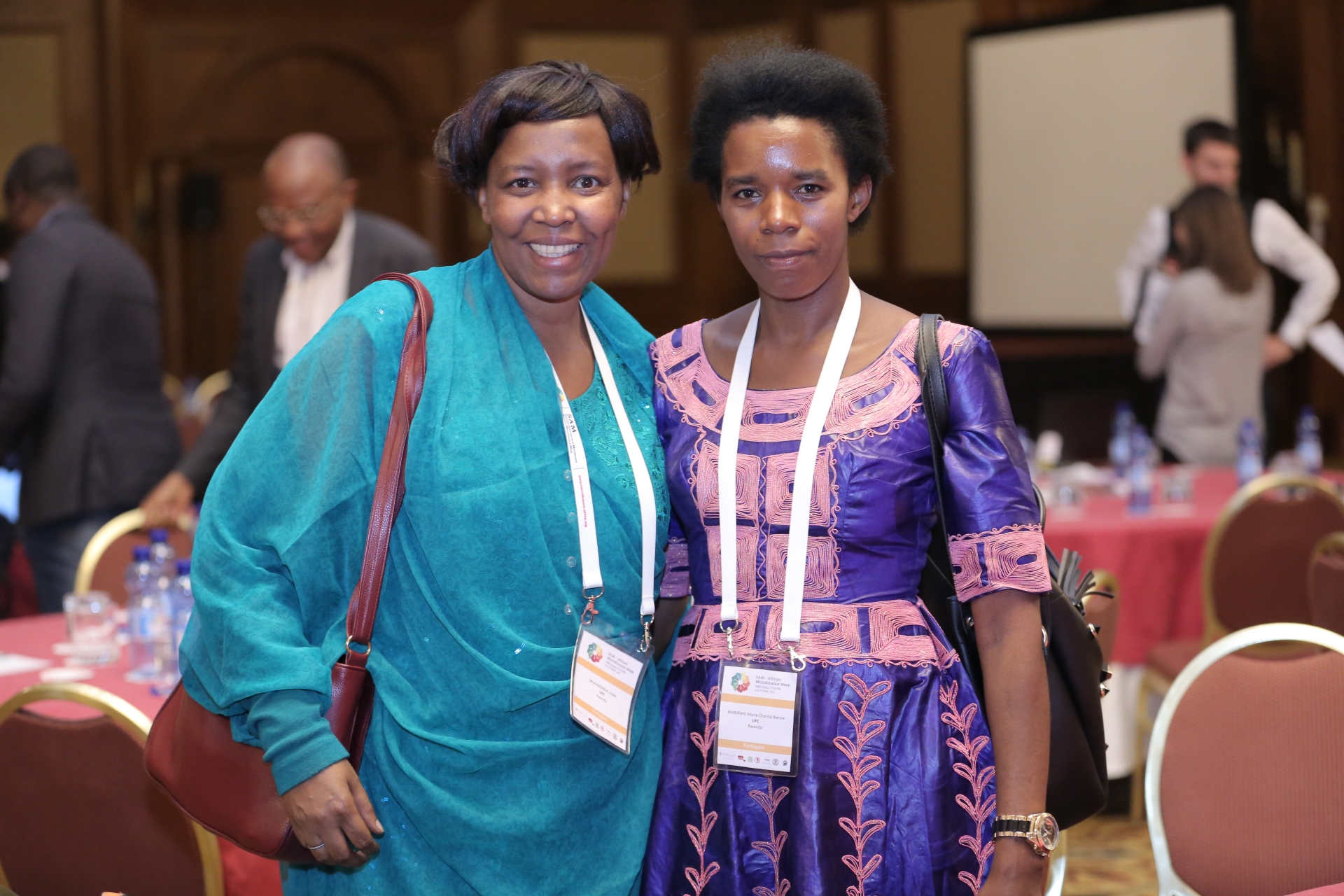
The SAM in Addis Ababa has facilitated exchanges between different microfinance stakeholders and investors on the concerns of African financial inclusion. The job creation achievements served as a model for the UFC.
From the invitation to the SAM until its closing, I was impressed by the impeccable teamwork that was done by the ADA staff, who was keen to make the SAM a great success. The team must keep the same enthusiasm in preparing for such events!"
